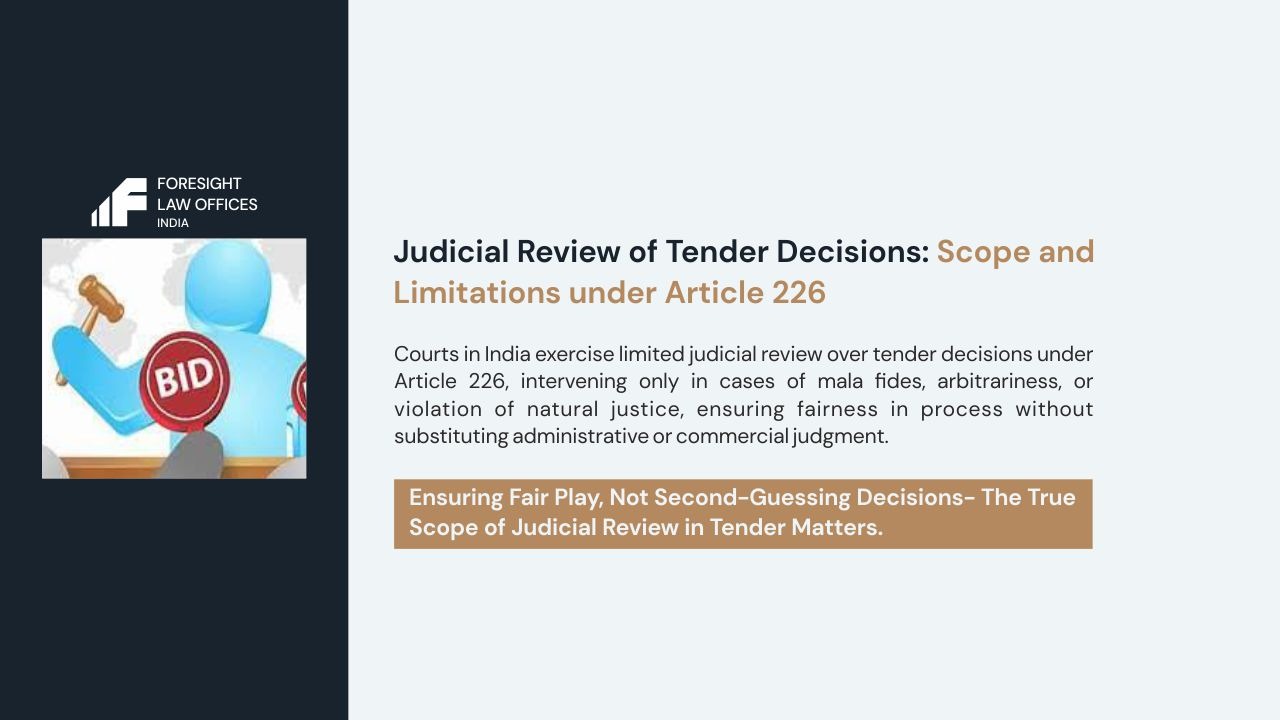Public procurement and tendering are central to the functioning of the Indian state. Government contracts often involve large financial stakes, competition among bidders, and the need to ensure transparency, fairness, and public accountability. Given this, tender disputes frequently reach the courts, where aggrieved bidders challenge tender conditions or awards alleging arbitrariness, discrimination, or mala fides. However, Indian courts have consistently maintained that judicial review in tender matters under Article 226 of the Constitution is limited.
This blog explores the scope and limitations of judicial review in tender decisions, the principles developed through landmark judgments, and the circumstances when courts intervene to ensure fairness in administrative action.
The Constitutional and Legal Framework
Under Article 226 of the Constitution of India, High Courts have the power to issue writs for the enforcement of fundamental rights or for “any other purpose.” This broad power includes the authority to judicially review administrative and quasi-judicial decisions of public authorities.
However, the exercise of this power is discretionary and not appellate in nature. Courts do not sit in judgment over administrative decisions as if they were appellate authorities. Instead, their role is confined to ensuring that decisions are made fairly, rationally, and in accordance with the law.
In tender and contractual matters, the courts apply public law principles because the government, while entering into contracts, acts as a trustee of public funds. Therefore, its actions must be guided by transparency, equality, and non-arbitrariness, principles enshrined in Article 14 of the Constitution.
Judicial Review vs. Contractual Disputes
Before delving into the scope of review, it is important to distinguish between judicial review and private law remedies.
- Private law remedies deal with contractual rights – for example, disputes over performance, breach, or payment, which are typically referred to arbitration or civil courts.
- Public law remedies, on the other hand, are concerned with the decision-making process, whether it was fair, transparent, and free from bias or arbitrariness.
In tender cases, the courts usually exercise judicial review before the formation of a contract, when the state or its instrumentalities are still exercising their public functions. Once a contract is concluded, the matter shifts to the realm of private law, unless there are glaring violations of constitutional principles.
Principles Governing Judicial Review in Tender Matters
Over the years, Indian courts have evolved clear parameters governing judicial interference in tender decisions. The leading cases have consistently emphasized that the courts should not act as “super tender committees.”
- Tata Cellular v. Union of India (1994) 6 SCC 651
This landmark judgment by the Supreme Court laid down the foundational principles of judicial review in tender cases. The Court held that:
- Judicial review is concerned not with the merits of the decision but with the decision-making process.
- The State must act fairly, reasonably, and in good faith; however, it has a freedom of contract and commercial discretion.
- Interference is warranted only if the decision is arbitrary, irrational, mala fide, or in violation of statutory provisions.
The Court eloquently observed that “the Government must have freedom of contract. In the tender or award of contract, certain discretion must be conceded to the authorities, but that discretion is not unbounded.”
- Raunaq International Ltd. v. I.V.R. Construction Ltd. (1999) 1 SCC 492
In this case, the Supreme Court emphasized that public interest must be the guiding factor in tender-related judicial review. The Court cautioned that interference should be minimal, as it can delay projects and escalate costs. It reiterated that courts are not to assess the comparative merits of bidders.
- Air India Ltd. v. Cochin International Airport Ltd. (2000) 2 SCC 617
Here, the Court stated that the role of judicial review is to check whether there has been any arbitrariness or bias, not to substitute the court’s decision for that of the authority. The Court observed that the “modern trend points to judicial restraint in administrative action.”
- Jagdish Mandal v. State of Orissa (2007) 14 SCC 517
This case further clarified the scope of judicial review, stating that interference is justified only if:
- The process adopted or the decision made is mala fide or intended to favor someone.
- The process is so arbitrary or irrational that no reasonable authority would have taken such a decision.
- Public interest is adversely affected.
The Court famously stated that if these elements are absent, courts should “refrain from interfering in commercial decisions.”
When Courts Interfere in Tender Decisions
Despite judicial restraint, courts do intervene when fundamental administrative law principles are violated. The main grounds include:
| Grounds | Explanations |
|
Mala Fides (Bad Faith) |
When a decision is motivated by personal bias, favoritism, or extraneous considerations, courts do not hesitate to intervene. For instance, if tender conditions are tailor-made to suit a particular bidder or if evaluation criteria are altered to ensure a predetermined outcome, such decisions are struck down. |
|
Arbitrariness and Unreasonableness
|
Courts examine whether the tender process or criteria are arbitrary, discriminatory, or lack rational basis. If a decision lacks transparency or violates the principles of equality under Article 14, it is liable to be quashed. For example, excluding a bidder for trivial technical reasons while ignoring major deficiencies in another bidder’s proposal may amount to arbitrariness. |
| Violation of Natural Justice | Though tenders often do not require a full-fledged hearing, courts ensure that the process adheres to basic fairness. If a bidder is disqualified without being given a fair opportunity to explain discrepancies or if the reasons for rejection are not communicated, the principles of natural justice are deemed violated. |
| Non-Compliance with Statutory or Policy Provisions | Authorities must adhere to the rules or guidelines governing the tender. If they deviate without justification; for instance, by ignoring mandatory procurement rules or bypassing the Central Vigilance Commission’s directives, courts intervene to enforce legality. |
| Public Interest | Even when individual bidders lack a strong personal claim, courts may interfere if the decision compromises public interest, for instance, when a project is delayed, costs escalate unjustifiably, or the public exchequer suffers due to unfair practices. |
When Courts Refuse to Interfere
Equally important are cases where courts decline to interfere, emphasizing that judicial review is not an appeal against administrative wisdom.
- Commercial Discretion
Authorities are best positioned to evaluate technical and financial qualifications. Courts avoid substituting their judgment on matters of commercial merit.
In Tata Cellular, the Supreme Court recognized that the government’s decision involves complex considerations that the judiciary is ill-equipped to evaluate.
- Minor Procedural Irregularities
If procedural lapses do not cause substantial prejudice or do not affect fairness, courts typically overlook them. The test is whether the irregularity vitiates the process or merely constitutes an immaterial deviation.
- Post-Contractual Disputes
Once a contract is executed, the court’s jurisdiction is limited. Disputes over performance, payment, or delay must be resolved through contractual or arbitration mechanisms, not through writ petitions.
Balancing Judicial Review and Administrative Efficiency
The balance between ensuring fairness and preserving administrative efficiency lies at the heart of tender jurisprudence.
Excessive judicial interference can paralyze decision-making, delay infrastructure projects, and deter genuine competition. Conversely, unchecked administrative discretion can lead to corruption and favoritism.
Courts have therefore evolved a “doctrine of judicial restraint”, intervening only when the decision is patently arbitrary or when public interest demands it.
In Michigan Rubber (India) Ltd. v. State of Karnataka (2012) 8 SCC 216, the Supreme Court reaffirmed this balance, holding that courts should not interfere merely because a decision appears to be erroneous or another view is possible. Interference is warranted only if the decision-making process is vitiated by illegality, irrationality, or procedural impropriety.
Conclusion
The law governing judicial review of tender decisions under Article 226 of the Indian Constitution strikes a delicate balance between the judiciary’s role as a constitutional guardian and the executive’s administrative freedom. While courts intervene to ensure that the tender process is not marred by arbitrariness, bias, or mala fides (bad faith), they exercise considerable restraint to respect the government’s essential commercial discretion. In practice, judicial review focuses squarely on the process, not the final outcome, aiming for fairness, not mere perfection, with the paramount consideration always being the public interest. Ultimately, the system incentivizes public authorities to maintain transparency, reasonableness, and strict adherence to due process as these are the clearest safeguards against potential judicial intervention.






